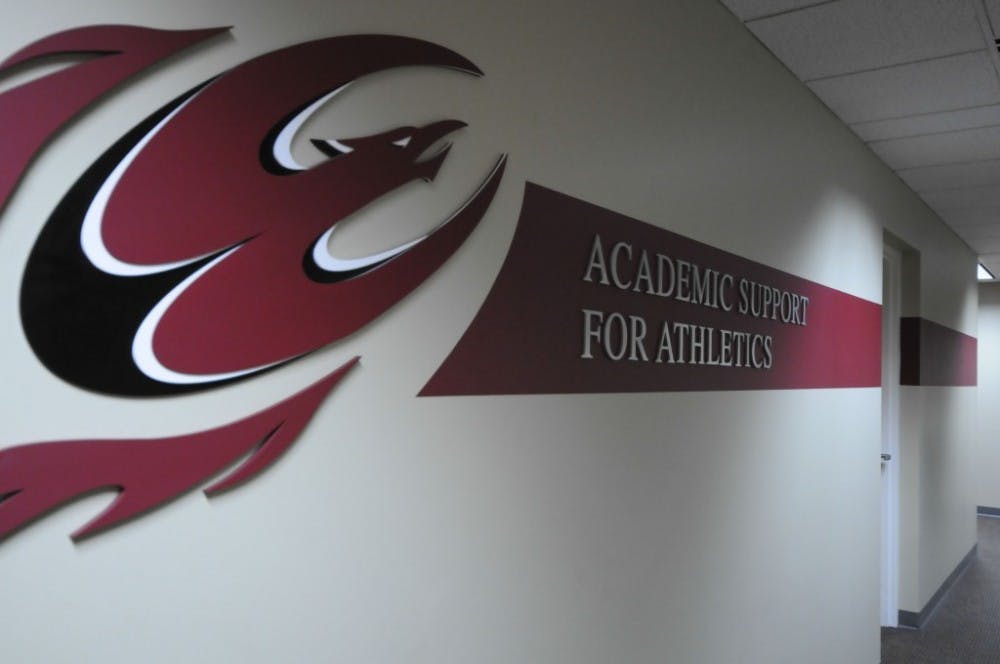Cayce Crenshaw arrives at her office in the Koury Athletic Center between 6:30 and 7:30 every morning and doesn’t leave until close to 10 p.m. most days.
Her job title is Assistant Director of Athletics for Academic Support Services, but it’s more than just a title to her.
“This isn’t my job, this is me. It’s my life,” Crenshaw said.
Crenshaw leads a team of four that oversees Elon University student-athletes and their commitments to both academics and athletics. Their main mission includes making sure there is balance between school and sports and coordinating things such as tutoring, study halls and class registration.
“I was speaking at a convention last summer with new practitioners in the field, and I said, ‘This can’t just be a job. You’re not going to get paid enough, the hours are crazy. This has to be a calling. It has to be something you love doing,’” Crenshaw said.
Crenshaw and her staff split up Elon’s 17 varsity sports teams so each receives the attention it needs. In addition to attending every game, the staff keeps an eye on the progress all student-athletes are making during the season and off-season.
Practice schedules are organized around class times, and study halls are mandatory for many athletes. No matter who the student is, the Academic Support staff cares.
“They have a syllabus from every guy on the team,” said Ricky Brown, a rising senior on Elon’s football team. “They definitely stay on you. They talk to us, check our classes, come in and make sure everyone’s there that’s supposed to be there.”
Seventy percent of Elon athletes have a grade point average above 3.0, something Crenshaw takes pride in. One goal for Elon Athletic Director Dave Blank is for each team to have an average GPA of 3.0. For Crenshaw, the foundation is laid when student-athletes come in as freshmen.
All freshmen have required study hall hours each week and meet with their advisers once a week to ensure the transition from high school to college is going smoothly. The focus of these meetings is mostly looking ahead, so student-athletes recognize when certain due dates are and if they’ll be missing class because of travel and game schedules.
“If freshmen get off to a good start, they can easily stay there,” Crenshaw said. “If not, you’re trying to dig out of that hole. “
Brown said the balance of football and academics was the toughest to manage during his freshman year, and the academic support staff helped him tremendously. Building good time management and organizational skills were critical to his success in his major of Sport and Event Management. Keeping younger players on the right track in the classroom is important to him as well.
“When coach [Rich] Skrosky and his staff got here, a big thing was taking younger guys up under your wing,” Brown said. “Making sure guys are held accountable for their work. If you know someone’s not going to get somewhere or do their work, make sure you’re there to help them.”
The guidance junior John Antonelli received from the Academic Support staff as an underclassmen helped shape him into the Dean’s List student he is today. A relief pitcher on the baseball team, Antonelli is double majoring in physics and math. But he wasn’t always so sure about what he wanted to do.
“After my sophomore year, I declared [majors]. Then I changed over the summer, and when I got back in the fall, I changed back to the original,” Antonelli said. “So many times when you’re unsure of your major, [Academic Support] is there to guide you in the right direction.”
He said he’s finally struck the right balance between school and sports, something he’s been trying to do since high school. But there are still sacrifices to be made.
“Some nights, it’s more difficult than others,” Antonelli said. “You have to be willing, instead of going out or hanging with friends, to stay in the library and get things done. In the big picture, baseball’s going to end at some point. Academics are what’s going to take you on for the rest of your life.”
Antonelli has an internship this summer with Credit Suisse, an investment banking company. Brown hasn’t been able to complete an internship yet because of his schedule with football, but his goal down the road is to work in the front office of a professional sports franchise. He’s currently taking a sports marketing class with Professor Craig Schmitt to help him prepare for the future.
“It’s interesting to look at the business side of sports,” Brown said. “We always only see what’s on the field.”
At the heart of Crenshaw’s mission is guiding athletes on the right path so they’re in a position to succeed when their time on the field or court is finished.
“We want to make sure all student-athletes are taking advantage of all they can at Elon,” she said. “We want them looking at undergraduate research, studying abroad, doing an internship. We make sure everybody’s maximizing the Elon experience.”
Crenshaw said she loves seeing Elon’s athletes excel both on the field and in the classroom, and that all leads up to the most fulfilling part of her job — graduation.
She stands in the back taking pictures of all the athletes with their diplomas in hand, open for the photo.
After all those long hours in the office, her work has paid off. Her lifestyle has helped shape a career and life for Elon student-athletes.


